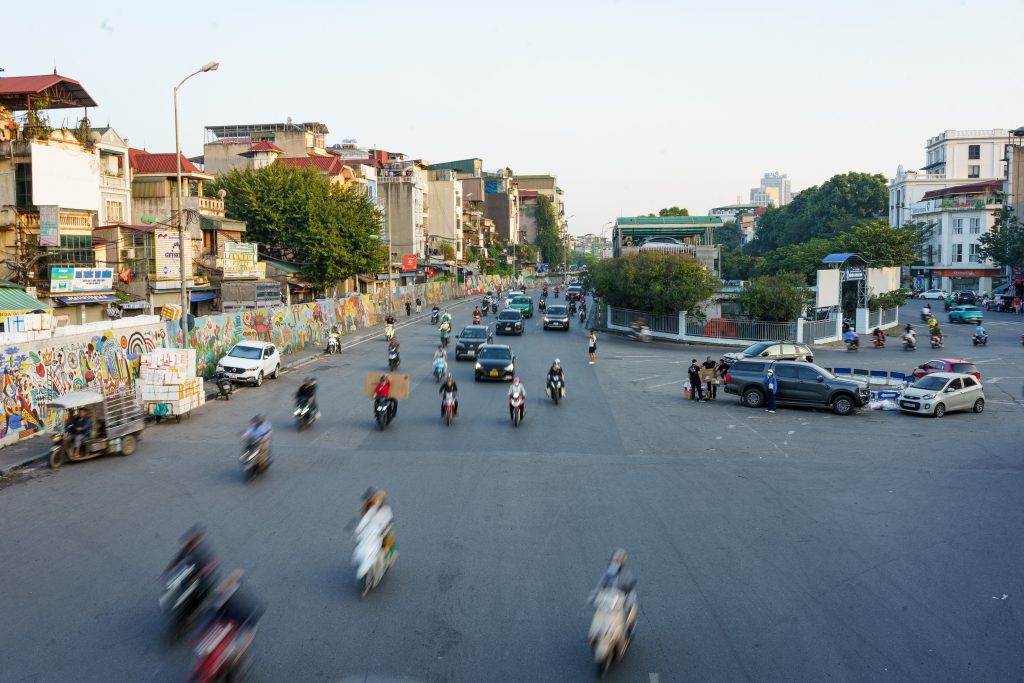Vietnam’s economy emerged from COVID-19 with a surprisingly high 8 per cent annual growth rate at the end of 2022, but took a gloomy U-turn in the first half of 2023, plagued by falling exports due to monetary tightening in the developed world and a slow post-pandemic recovery in China.
Exports were down 12 per cent on-year, trailing off to around 6 per cent towards the latter half of the year. The industrial production index had negative growth of 15 per cent early in 2023 but ended the year with a positive increase of about 1 per cent. As exports constitute 80–90 per cent of Vietnam’s GDP, the poor trade performance resulted in estimated annual growth of around 5 per cent in 2023, over two percentage points lower than the pre-pandemic average.
Monetary policy was loosened throughout the year to support growth, resulting in bank credit growing by 13.5 per cent overall and 1.7 per cent in the last 20 days of 2023.
This amounted to 202.7 trillion dong (US$8.3 billion) being pumped into the economy during the last month of the year. With CPI estimated to have risen by 3.7 per cent and core inflation by 4.2 per cent during 2023, there is a limit to how much monetary policy can be relied upon going forward, without seriously compromising financial stability. Vietnam’s corporate debt market was at a standstill by the end of the year, and urgently needs resolution.
There is fiscal space to support growth and the government did accelerate the implementation of the Socio-Economic Recovery program, with disbursement of the public investment budget increasing by over 43 per cent in the first half of 2023. But Vietnam’s disbursement rate has historically been quite low, only reaching 68 per cent of its target in 2022. This may be partially due to the government’s ongoing anti-corruption campaign despite its other benefits.
Delayed public investments caused electricity shortages during 2023 due to a lack of transmission capacity, negatively affecting foreign investors such as Intel, which decided not to expand its chip-making and testing facility. Samsung, Vietnam’s largest foreign investor, laid off workers and reduced working hours for others, though this was probably due to reduced global demand rather than a rumoured market pullout.
Vietnam’s economy is extraordinarily dependent on foreign direct investment to drive exports and overall growth. Foreign-invested sectors historically accounted for around 70 per cent of total export turnover but in the last two years, this percentage increased to 74 per cent, indicating a decline in the contribution from the formal domestic private sector.
The latter is already small and underdeveloped compared with Thailand and China. Even into 2040, the World Bank projects that slightly over half of Vietnam’s workforce will still be engaged in the informal sector.
If this situation is not remedied in the medium term, Vietnam risks being unable to move up the value chain in its export-oriented manufacturing industries and losing its competitive edge as foreign investors move to lower-cost destinations.
The anti-corruption campaign has had benefits such as domestic businesses experiencing significant reductions in unofficial fees from 70 per cent in 2006 to 41.4 per cent in 2021. Also, by highlighting the corrupt practices between the state and large business conglomerates, especially in real estate transactions, the campaign brought about a more equitable environment for small domestic businesses, particularly in the purchase of state-owned land.
The time is ripe for a renewed round of state-owned enterprise (SOE) reform. But this needs to be carried out in a way that provides a more equitable environment for small- and medium-sized enterprises in the domestic private sector, rather than just benefitting individuals and groups that are well-connected with the SOEs.
Looking ahead into 2024, Vietnam’s economic growth is expected to be in the range of 5.5–6 per cent, albeit with a great deal of uncertainty on account of geopolitical tensions as well as lingering fears of recession in the developed world economies. This projection is based on continued recovery in manufacturing exports and growth in port facilities in the near term.
The slowdown in 2023 provides a timely reminder of the need for structural reforms in SOEs, government administration and regulatory processes, especially in areas related to financial regulation. Vietnam needs to hit pre-pandemic annual growth levels of 7–8 per cent for at least another decade in order to realise its goal of reaching middle to upper-middle income status in the next 15 years. Hopefully the slowdown has provided the political will for the government to continue with these reforms.
Suiwah Leung is Honorary Associate Professor at the Crawford School of Public Policy, The Australian National University.
This article is part of an EAF special feature series on 2023 in review and the year ahead.


Vietnam's post-pandemic promise fizzled in 2023, with plunging exports and a sluggish domestic sector dragging growth down to 5 per cent. Falling foreign investment, like Intel's halted chip expansion, exposed structural weaknesses — an overreliance on foreign firms, a stunted domestic private sector and red tape slowing progress. While the government has room to stimulate the economy and its anti-corruption campaign shows promise, Vietnam needs bolder reforms — revamping state-owned enterprises and streamlining bureaucracy — to regain its pre-pandemic momentum and climb the manufacturing value chain. The stakes are high. Success means reaching middle-income status; failure risks losing its competitive edge as investors seek lower-cost destinations. 2024 will be a crucial year for Vietnam to prove it can walk the reform talk.